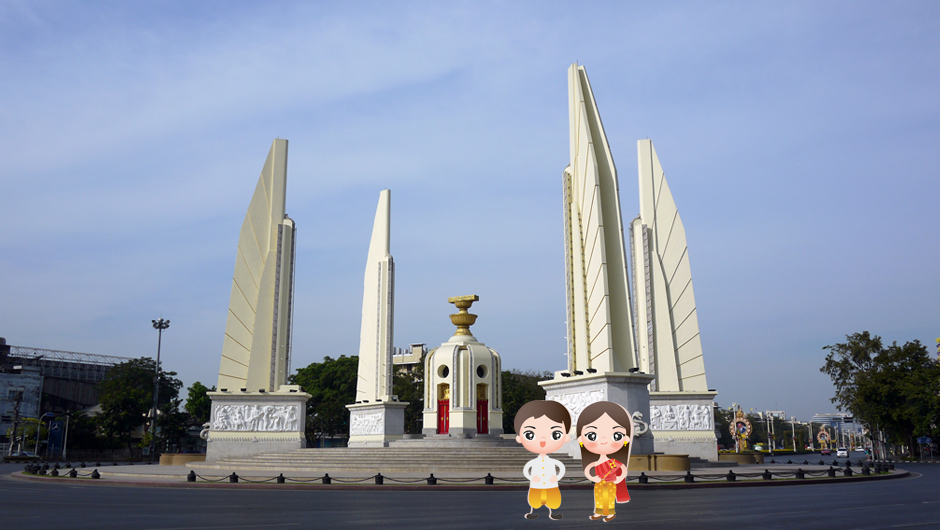Thailand's Freedom Journey

Thailand is the only country in Southeast Asia that was not colonized by Western powers. This is attributed to the efforts of the Thai monarch to protect the territory, while at the same time trying to modernize the state. However, there came a lot of global and domestic challenges, limiting economic opportunities and heightening the sufferings of the poor.
This led to the Siamese Revolution of 1932 that sparked the change in Thailand’s political system. On 24 June 1932, the People’s Party seized power in Siam that led to the transformation from absolute monarchy to constitutional monarchy.
To commemorate the revolution, Field Marshal Plaek Phibunsongkhram started the construction of a monument on 24 June 1939, which was completed within a year and was introduced to the public on 24 June 1940. The Democracy Monument, located in Ratchadamneon Avenue in Bangkok, is a reminder that sovereign power belongs to the people.
Basis of Rule of Law
10 December 1932 is the date when the 1932 Constitution of Siam was promulgated, replacing the 1932 Temporary Charter. This event was later known as Constitution Day, a milestone in the democratic transition in the country.
It has been said that coups in Thailand have been cyclical, which have also prompted changes in the constitution – the 20th in the last 85 years. In spite criticisms surrounding the current constitution, there is optimism especially given the prospects of new elections.
Promoting social market economy
King Bhumibhol Adulyadej is proven to be the country’s key personality - his royal projects addressed people’s basic needs, and he provided solutions to tackle the many challenges that Thailand faced from the international sphere to domestic socio-economic and political field.
One of the well-known projects he implemented was the Philosophy of Sufficiency Economy (SEP). Its principle is that economic development must be done step by step, beginning with the strengthening of economic foundation. SEP is a method of development based on moderation, prudence, and social immunity. It is recognized as a tool to achieve the Sustainable Development Goals (SDGs), an innovative approach to development, and the promotion of participation in decision-making process.
The New Theory is known as the most distinct and concrete example of the application of the SEP in the agricultural sector. His Majesty also initiated the establishment of the Chaipattana Foundation, which aimed at improving social welfare to build the capacity of communities, especially farmers, to become self-reliant people.
King Bhumibhol’s reign started in 1946 and ended in 2016.
Economic development must be done step by step. It should begin with the strengthening of our economic foundation, by assuring that the majority of our population has enough to live on… Once reasonable progress has been achieved, we should then embark on the next steps, by pursuing more advanced levels of economic development.

Economic freedom and democracy go hand in hand
In 1988, the Thai Nation Party won the election, and General Chatchai Choonhavan became prime minister. Chatchai, who had military and diplomatic background, said he wanted to turn Indochina “from a battle field into a marketplace” to promote economic prosperity. Chatchai’s government initiated various infrastructure projects, including telecommunications network, the Eastern Seaboard, and roads and rail networks.
Chatchai’s government was deposed by the National Peace Keeping Council (NPKC), a military council, in a coup d’etat in 1991. It was accused of massive corruption and abuse of power. The following year, however, people held street demonstrations geared against the military government.
Youth paint bright dreams for Thailand
Corrupt government, power seizure, and to a certain extent mass protests have become major challenges in Thai domestic affairs. As such, Thailand is perceived to pursue undemocratic practices. Nonetheless, Thai youth are still highly participative in activities that they believe could initiate change in various areas, and more siginificatnly in society. They hold the key to keeping Thai democracy alive.
Dream Thailand, spearheaded by FNF Thailand is one of the platforms for people, especially the youth, to express their voices, and wishes to realize their dream society. These wishes are curated, and are handed to policymakers so they may be integrated in the policy agenda.
FNF Thailand supports its Thai partners who work for democracy, rule of law, human rights, and market economy since 1975. The office co-organizes workshops, training, seminars, and game development to promote civic education.
SIM Democracy, a board game that simulates community participation, and the Rights Card Game both developed by FNF Thailand have been adopted in other countries including Indonesia, Malaysia, Myanmar, and South Korea.